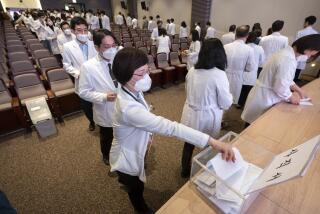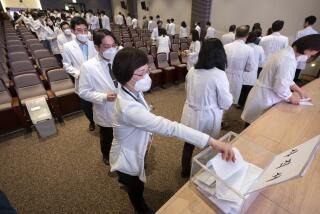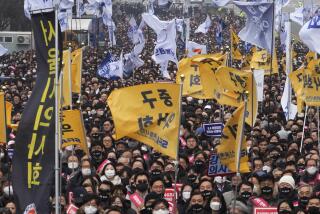Health Workers Stage Protest Rally in Moscow : Labor: They want bigger budgets, more pay. All but emergency cases are being turned away from hospitals and clinics.
- Share via
MOSCOW — Thousands of doctors, nurses and other medical personnel enraged by worsening work conditions and poverty wages swarmed to a rally outside the Kremlin on Tuesday and pledged to continue their work slowdown until their demands are met for bigger budgets and a tenfold pay increase.
About 40% of the city’s clinics, hospitals and medical institutes have joined in the 16-day-old nationwide job action by turning away all but emergency cases, according to strike organizers.
About 7,000 angry medical workers carrying signs with slogans such as “We Are Striking for Your Health!” and “Forgive Us, Hippocrates!” gathered in Manezh Square to try to attract the government’s attention.
Teachers and public bus drivers have also been holding strikes to demand higher wages in what has become the biggest wave of public protest since Russian President Boris N. Yeltsin launched his radical policies to propel Russia toward a market-based economy early this year.
“Bring Yeltsin’s gang to court!” chanted the doctors, nurses and dentists, many wearing white smocks. The slowdown, which has spread to hospitals in two-thirds of Russia, highlights the crisis in the country’s socialist medical network, which was long touted as a showpiece of the Soviet system.
Doctors complain that shortages of vital materials ranging from antibiotics to aspirin are so severe that they are constantly forced to compromise their patients’ treatment and must routinely ask patients or their relatives to bring both medicines and food. Nurses say their salaries are so low that they cannot afford to buy even new underwear for their children.
Officials express sympathy for the medical workers but worry that the slowdown threatens public health and could set a precedent for workers in other fields at a time when mass labor unrest could derail Yeltsin’s ambitious economic reform plans.
“We regard the demands formulated by the strikers as fully justified,” said Anatoly I. Toroptsev, a senior official at the Russian Health Ministry. “But their methods are not. In our profession we must look for more cautious approaches.”
Toroptsev said the health care system has been receiving only 42% of the funds needed to function at an absolute minimum. The government appears to be starting to listen to the Health Ministry’s demands, and Yeltsin is expected to consider a decree increasing salaries almost three times. But government proposals do not come close to meeting the medical workers’ demands for a tenfold pay increase.
At the office of Moscow Mayor Gavriil Popov, officials were worried that the new wave of strikes and slowdowns will help Communist agitators.
“It is really worrisome that the pro-Communists try to use the strikes of medical workers, teachers and bus drivers to build new networks of supporters,” said mayoral spokesman Sergei S. Stupar. “It all plays in the hands of the Communist forces.”
At Moscow Clinical Hospital No. 24, the city’s premier proctology center, half of the 240 beds were empty, and doctors and nurses were adamant about not admitting patients for routine surgeries until their demands are met.
“The medical workers do not want our patients to suffer,” said Vladimir V. Gobel, an anesthesiologist. “We did not choose this form of protest--the government forced us into it.”
The conditions at the hospital, Gobel and other doctors said, are rapidly declining as they run out of everything from disposable catheters to antibiotics. Almost all of the hospital’s supplies of imported medicines have been used up, so doctors must prescribe poorer-quality, domestically produced drugs--if they exist--or patients go without.
“We’re working in the Stone Age here,” Yelena R. Myshkovskaya, 35, a veteran nurse, said in a voice full of frustration. “I had surgery this morning, and I had no anesthetic to give my patient.”
But Myshkovskaya and her colleagues stressed that more medicine and better equipment alone will not satisfy them.
“My faucet broke at home, and I had to pay 500 rubles. That was more than half of my monthly salary gone in one shot,” Myshkovskaya said. “How am I supposed to feed and clothe myself and my daughter?”
Salaries for doctors, teachers and other state workers whose jobs are not connected with manufacturing have not kept pace with factory workers’ wages.
The nurses at Clinical Hospital No. 24 have to do the work of janitors on top of their other responsibilities, both to supplement their incomes and because all of their sanitary personnel have quit over their wages.
Pay increases for doctors have lagged so far behind inflation that even highly qualified surgeons cannot make ends meet.
“I make 1,200 rubles a month for doing surgeries, while a janitor in the subway makes 1,500 rubles,” said Ilya M. Buriyev, 38, a surgeon and the chairman of the strike committee at the prestigious Vishnevsky Institute. “If my parents did not give us money, my family would not make it.”
At Vishnevsky Institute, doctors have decided to treat patients according to how much money they receive from the state. The state gave the institute only 30% of its normal budget this month, so the institute is accepting patients for only 30% of its beds.
The patients at Clinical Hospital No. 24 said they unanimously support the job action.
“The state is committing a crime by not raising their pay,” said Galina Kozhanova, 41, a radio-electronic engineer recovering from surgery.
Nadezhda P. Samarina, 69, a retired warehouse worker who was also recovering from surgery, agreed: “They are responsible for our lives, and they live on poverty wages--this is absurd. How dare our government push our doctors to take such extreme action?”
More to Read
Sign up for Essential California
The most important California stories and recommendations in your inbox every morning.
You may occasionally receive promotional content from the Los Angeles Times.







